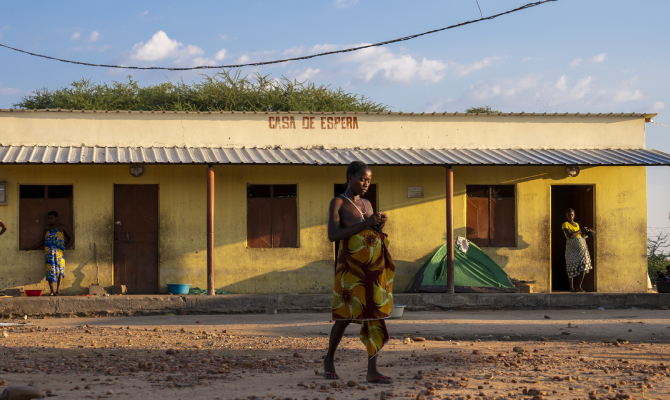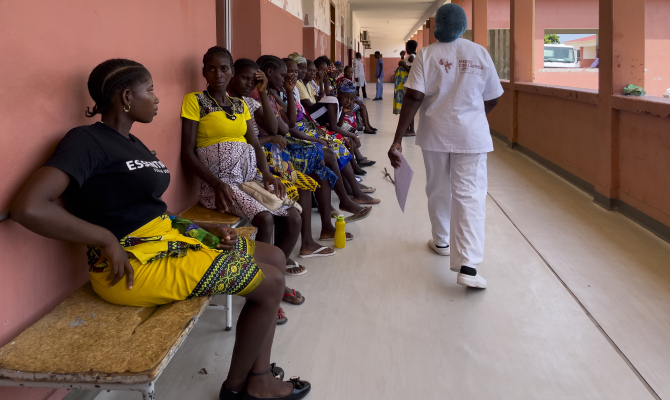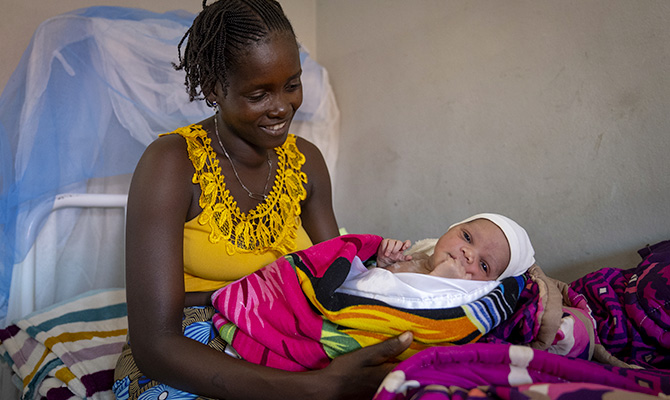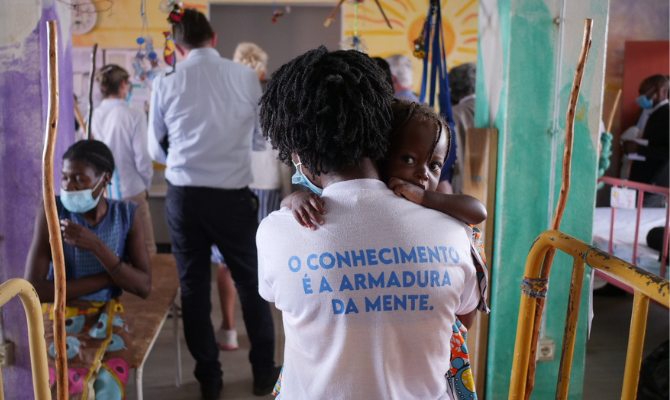A low-cost yet effective introduction to care for pregnant women in the late stages of their pregnancy therefore ensure assisted and safe delivery. Maternal Waiting homes (MWH) – casa de espera in portuguese, are residential structures located beside Chiulo Hospital a facility that serves a population of approximately 306,550 people.
Pregnant women with at-risk pregnancy come to this safe space, introduced by CUAMM in 2012, when their due date is approaching. Here, they can be monitored by health professionals and easily access the hospital in case of emergency. During the time they spent at casa de espera, women receive prenatal visits and participate in awareness activities on sexual and reproductive health as well as nutrition.
THE ROLE OF COMMUNITIES HEALTH WOKERS
Community health workers engage pregnant women in cooking demonstrations to teach sustainable weaning practices. In Cunene region, where drought conditions remain severe and will likely contribute to further deterioration of the humanitarian situation, learning how to feed newborns and babies with the limited food available is a priority to prevent malnutrition.
«Through the demonstrations, we show women how to feed their babies from delivery to their first 1,000 days of life. What we try to do is to inform them about the nutrition value of locally grown food that is not only easy to purchase but also more affordable – said Ermelinda Cativa, CUAMM Community Health Worker in Chiulo. At times, people think processed food and drinks are good for their health and for that of their children. For example, they buy bottles of sparkling drinks instead of making mukua juice that costs less and it is nutrient-dense».
What, when and how children eat is more important before age 2 than at any other time in life. Children need the right foods at the right time to grow and develop to their full potential and the 1,000-day period from pregnancy until a child’s second birthday is the most critical time for good nutrition. Unfortunately, prolonged droughts in Angola are having a major impact on agriculture affecting soil fertility, crop yields and food production. As a result, undernutrition and malnutrition are becoming the largest threat to health, being women and children the most susceptible.
THE CLIMATE CRISIS
Community Health Workers like Ermelinda and Belmiro pay an essential contribution to their community. According to the United Nations, Angola is experiencing the worst climate crisis in 40 years being the province of Cunene the epicentre of this crisis. As a consequence, an estimated 3.8 million people in the country have been forced into food insecurity.
«Women and children are paying the higher price of climate change – said Belmiro Fernandes, Community Health Worker in Chiulo. They are the one who seek for water, sometimes they have to walk miles to fill a jerry can that will be used to drink, wash and perhaps water a small piece of land. In fact, because of prolonged droughts, machamba are dry most of the year and growing crops becomes a challenge».
Agricultural activities are severely hindered by droughts, as a consequence growing crops is becoming a challenge here. While disasters threaten livelihoods, thousands of people are forced to cope, adapt and out-migrate to urban areas where limited income opportunities and higher living costs end up affecting people’s health. Womens are the one suffering the worst drought-related outcomes. Living in hardest-to-reach areas and holding the responsibility of both domestic works and livelihoods, pregnant women struggle in accessing healthcare services. As a result, traditional medicine and home births are often favoured.

MWH were first adopted in the early 20th century in Northern Europe, Canada and the United States to reduce the distance between pregnant women and health facilities resulting in an effective solutions in low resources settings where limited qualified health personnel is available. Doctors with Africa CUAMM has introduced casa de espera in Chiulo hospital in 2000 to later adopt it in Ethiopia and Tanzania as well.
The Missionary Catholic Hospital of Chiulo, situated in Ombadja Municipality, Cunene Province, Angola serves a population of approximately 306,550 people. Doctors with Africa CUAMM started operating in the facility in 2000 working both within the hospital, with a focus on maternal and newborn health and at community level, through out-reach health activities. The hospital has a capacity of 234 beds. It consists of paediatrics, gynaecology, vaccination, surgery, ophthalmology, internal medicine, emergency room and physiology departments. In 2023 alone, the hospital performed over 2,000 deliveries, 6,000 prenatal visits and more than 1,000 paediatric admissions.





